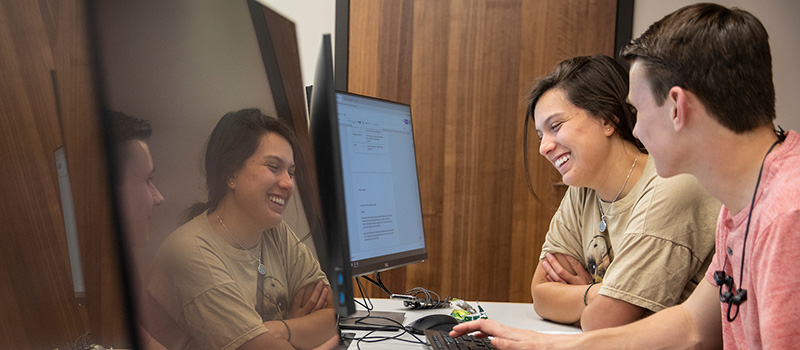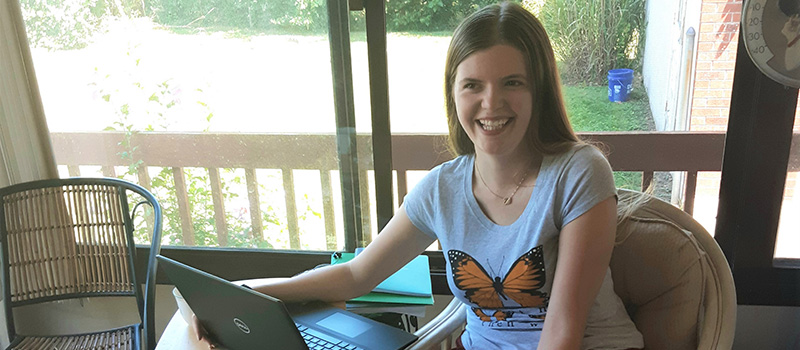Technological access for all
August 20, 2020 — A powerful windstorm last week gave Grinnell College faculty and staff members an idea of what it’s like to try to get work done without computer and internet access.
For some Grinnell College students, a similar lack of technological access is an everyday predicament rather than a temporary problem. With Fall Term 1 being conducted online, the College is striving to meet the technology needs of those students before the term begins on Aug. 31. Alumni and friends of the College have played a critical role in this effort.
More than $100,000 has been raised from gifts since Aug. 10 to the Supporting Our Students (SOS) Fund. An anonymous parent donor offered a $2-for-$1 match for gifts, increasing the fundraising total to more than $300,000. Due to an outpouring of support, the goal of raising $300,000 was achieved in just nine days.
“Their generosity makes me want to weep with gratitude,” says Maure Smith-Benanti, dean for diversity, equity, and inclusion. “Student Affairs and our colleagues across campus could not have provided the level of care, consideration, kindness, and attention to equity without their support. There have been so many instances when students were helped by the kindness of strangers.”
 A 2019 photo shows students using computers on the Grinnell College campus. With the transition to remote learning, students can receive a laptop and hotspot to help resolve difficulties with technological access.
A 2019 photo shows students using computers on the Grinnell College campus. With the transition to remote learning, students can receive a laptop and hotspot to help resolve difficulties with technological access.
For eligible students living within the U.S., Grinnell will provide and send laptops and/or internet hot spots directly to them. The laptop will be theirs to use at no cost for the remainder of their time as a student at Grinnell. For those living internationally, the College will provide a technology grant equivalent to the cost of the package provided to eligible U.S. students.
When the College announced March 10 it would be switching to remote learning after spring break to mitigate the COVID-19 pandemic, a number of students had concerns about how to travel home and about having the technology at home to access online classes. The SOS Fund was originally established to help resolve both problems. Between March 11 and June 30, a total of 589 donors made gifts totaling more than $130,000 to the SOS Fund.
For Loyal Ulm ’20, the SOS Fund provided reliability. Ulm’s computer kept shutting off on its own. Before leaving campus in March, Ulm borrowed a laptop for the remainder of the semester.
“Getting the laptop was security for me,” Ulm says. “Knowing that I would not have trouble completing assignments or taking finals put my mind at ease, especially since my existing laptop eventually shut down completely.”
A Spanish and psychology graduate now living in Iowa City, Ulm is taking a gap year and job hunting before enrolling in law school. Ulm feels remote learning can be effective at Grinnell, pointing to a spring class where students discussed subjects using the Piazza online platform. “We had 24 hours to respond, and there were so many interesting contributions,” Ulm says.
Despite having to leave for Kentucky mid-semester, Mary DaVega ’21 earned all A’s and was on the Dean’s List for the first time in her college career. DaVega initially did not have a working computer and her grandmother’s house lacks internet access. Before she left, Information Technology Services (ITS) provided a Dell laptop with ample storage, a webcam, and a portable high-speed connection Wi-Fi hotspot. DaVega could video chat her professors, open many different programs at the same time, and store all the needed readings and textbooks.
 Mary DaVega ’21 sits at her grandmother’s house in Kentucky with the Dell laptop she received from Grinnell College to help her succeed with remote classes.
Mary DaVega ’21 sits at her grandmother’s house in Kentucky with the Dell laptop she received from Grinnell College to help her succeed with remote classes.
“This laptop opened my world and put me on the same level as my peers,” she says. “I felt that online school would not be so rough after all with this tool.”
Heading into fall classes, students have been making the College aware of their technological needs through the office of financial aid, student affairs, academic advising, faculty advisors, and via a survey. Based on current requests, approximately 200 students need remote learning technology so that they may participate in Fall Term 1. This need may continue to grow. The 200 new requests are not only from first-year and transfer students, but also students whose current circumstances have changed, Smith-Benanti says.
“I think the biggest shock as we watched the summer unfold was the significant increase in financial need for our students, presumably as a result of the impact of COVID-19 tearing its way through the country,” adds Dave Robinson, chief information officer. “Suddenly we found ourselves looking at a different set of problems: not just how can faculty deliver as close as possible to a Grinnell experience over a remote connection, but also how can Grinnellians take part in that experience – particularly on the other end of an internet connection as a remote student?”
Fall Term 1 will feature more courses that have synchronous activities. That means engaged learning will take place simultaneously, independent of students’ time zones.
Robinson says he’s really proud of all the work, problem-solving, and practical solutions the ITS team have put in place since moving online; many of which have come directly from conversations with faculty and learning the problems they face to deliver their classes.
“We have built out many new systems and services while trying to keep technological requirements as simple as possible to assist with equity as well as decluttering the student digital experience,” he says. “I cannot understate the criticality of this fundraising effort, and my sincere gratitude for everyone who made even a small contribution for recognizing the value and significant practical impact this gift will have on our students.”
DaVega says if Grinnell had not provided her with a laptop and internet connection, she would have been working on a nearly broken laptop hand-me-down, relying on family members to turn on a hotspot from their cell phones.
“A level playing field between socioeconomically disadvantaged students and those with means begins with having the right tools; perseverance can only go so far if you do not have what you need to get by,” she says. “Donors are helping lift the burden off many students. Gifts to the SOS Fund have helped level the playing field in a time where staying at home puts some students at a disadvantage.”
—by Jeremy Shapiro
To read more alumni news, check out our news archive and like the Alumni & Friends Facebook page.